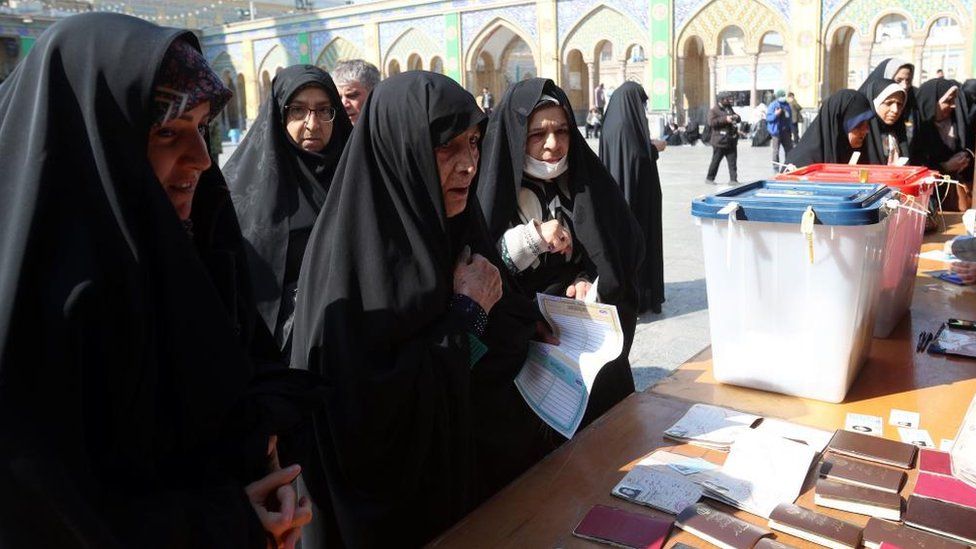Iran elections: Polls open in first elections since mass protests
- Published

Voting is under way in Iran as the country holds its first elections since the 2022 anti-government protests.
Friday's elections are seen as a crucial test of legitimacy and national support for Iran's leadership - but a low turnout is expected.
Voter apathy remains high following a period of unrest after the death of Mahsa Amini - who was detained for wearing an "improper" hijab.
More than 61.2 million people are eligible to vote.
Two separate polls are taking place on Friday: one to elect the next members of parliament, and another to elect members of the Assembly of Experts.
The assembly selects and oversees Iran's most powerful figure and commander-in-chief, the supreme leader - who makes key decisions on issues important to voters, such as social freedoms and economic conditions.
On Thursday, current Supreme Leader Ayatollah Ali Khamenei - who has held the position for more than three decades - encouraged voters to cast their ballots.
Refraining from voting "would not solve anything", he said.
Caroline Davies, the first BBC reporter in Tehran since 2019, reporting on the election
Outside one of the many polling stations in central Tehran one man hands out roses to voters. He tells me it is in celebration of Iran choosing the right person.
Hosseinieh Ershad is a religious institute, but also one of the polling stations opened to local and international media who scrum around its steps and into the voting hall.
The large media presence means it is also a location some want to be seen to be voting at.
A newly married couple came straight to vote, the bride still dressed head to toe in white.
Former Iranian MPs and ministers also line up to cast their vote and talk to the media.
There have been concerns about voter turnout at this election. Early polling suggested it could be at a record low and thought to be particularly low in Tehran.
In the run-up to the elections, state media tried to encourage voting and build enthusiasm by airing dozens of elections specials and creating new channels to give candidates airtime.
Voter turnout is expected to be low, however, with a state-linked polling agency projecting a 41% turnout for the parliamentary elections - which, if accurate, will be the lowest turnout in the past 12 such ballots.
Many Iranians are reluctant to vote - or choosing not to - following the mass protests of 2022, which were triggered by the death in custody of 22-year-old Mahsa Amini.
Iran's harsh crackdown on protesters saw hundreds of people killed and thousands injured. Many were arrested and remain in prison - and in some cases, received the death penalty.
Since then, Iran's political and social atmosphere has become more repressive and the public has become further dissatisfied with the government.
This year, a record number of 15,200 candidates were approved to stand for the 290 seats in the parliamentary election - but only 30 were from the reformist camp.
Reformists have described the elections as "meaningless, non-competitive, unfair, and ineffective in the administration of the country".
On Thursday, US spokesperson Matthew Miller said a "great number of Iranians" had no expectation that the elections would be free and fair.
"The world has long known that Iran's political system features undemocratic and non-transparent administrative, judicial and electoral systems," he added.
Polls opened at 08:00 (04:30 GMT) and are expected to remain open for 10 hours - though in previous elections voting time was extended up to midnight in some cases.
Related Topics
- Published29 February
- Published28 February
- Published21 September 2023